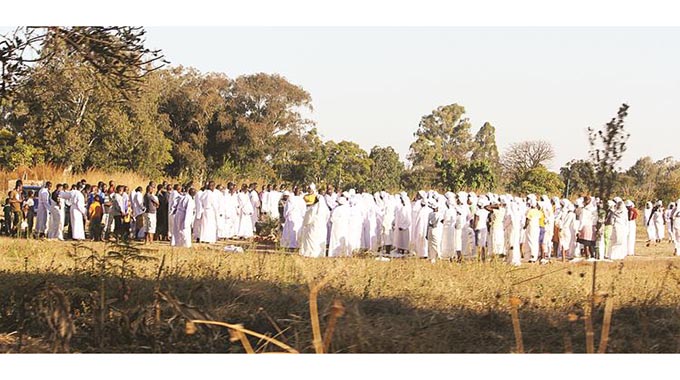New Covid-19 restrictions take effect . . . get WHO backing

Mukudzei Chingwere
Herald Reporter
Intensified lockdown measures coming into force today that bar all social and religious gatherings, while firmly enforcing existing protocols in the business sectors, have been endorsed by the World Health Organisation as a prompt, effective and welcome measure following last week’s noticeable rise in Covid-19 infection rates.
Vice President Constantino Chiwenga, in his capacity as Health and Child Care Minister, announced the intensified lockdown on Saturday to come into effect today.
The measures keep the economy open, although all in business have been warned that enforcement will be tighter, with offenders now facing the possible loss of business licences.
The major changes are a one hour reduction in the maximum number of working hours to 8am to 6pm, duty staff on the premises in non-essential enterprises to be at half level, all meetings and workshops to be virtual, restaurants only allowed to serve take-aways, and bottle store hours chopped to 10am to 4pm, with owners responsible for stopping customers drinking in or around the premises.
The major change to prevent or slow infection was a ban on all religious and social gatherings, except funerals that have been limited to 30 people.
Night clubs and beer halls remain shut.
VP Chiwenga’s intervention was immediately endorsed by the WHO, which reiterated the need to follow scientifically-proven interventions in the fight against Covid-19.
Restrictions have a huge impact on people’s social lives and generally people do not like them, but Zimbabwe has been minimising the impact of Covid-19 by moving swiftly and comprehensively very early in any changes in infection rates.
WHO Country Representative to Zimbabwe Dr Alex Gasasira told The Herald yesterday that the Government’s latest intervention was welcome and critical.
“What the Government of Zimbabwe is doing is in line with what the WHO recommends,” he said. “It is necessary for governments to carefully review local evidence of levels of Covid-19 transmission and assess when additional restrictions are required to prevent the health system from being overwhelmed.
“This is critical to prevent a very high death rate due to Covid-19. We have seen in other countries in our region and beyond, cases rising and overwhelming the health systems. The new measures announced by the Government yesterday will help to mitigate against such a situation in the country.”
WHO reiterated its commitment to continue partnering and collaborating with the Government to fight the pandemic, but warned citizens against lowering the guard against mitigatory initiatives particularly at a time Zimbabwe appears to be winning the battle.
Dr Gasasira said a spike in infections was of concern since it lowers chances of patients getting timely treatment at health institutions.
“The longer a patient goes without treatment, the lower their chances of survival, and the longer the virus can spread unseen in communities,” said Dr Gasasira.
“We would like to encourage everyone to play their part and comply with measures to reduce risk of exposure and infection with Covid-19, play their part to curb the rising number of infections.
“We commend the Government of Zimbabwe for the continued strong leadership and call on all stakeholders, members of the community to comply with the measures put in place so as to reduce the escalating transmission in the country.”
New cases have risen to 708 in the last seven days, a worrying trend which if left unchecked, would compromise Zimbabwe’s response to the infection.
As of yesterday, Zimbabwe had 1 323 active cases, Harare leading with 450 and Mashonaland West in second place with 267 cases.
A public health expert in the Health Ministry, who is part of a team that advises the Government on Covid-19, Dr Raiva Simbi, said the expert guidance was scientifically provenand could change depending on the available trends.
“What we have observed in the past week is an increase in the number of cases,” he said. “It is actually higher than the same period last year. The rising number of cases brings the issue of adherence to the prescribed protocols, as well as the effectiveness of the available measures.
“The advice is to strengthen containment measures. So the revised measures announced by the Government are really in order and that was the best thing to do under the present situation.”
Dr Simbi said their scientific group was also conducting some investigations on the regular questions like issues relating to re-infection, as well as the types of variants in circulation.
He said they had collected samples to check the variants present in Zimbabwe.







Comments